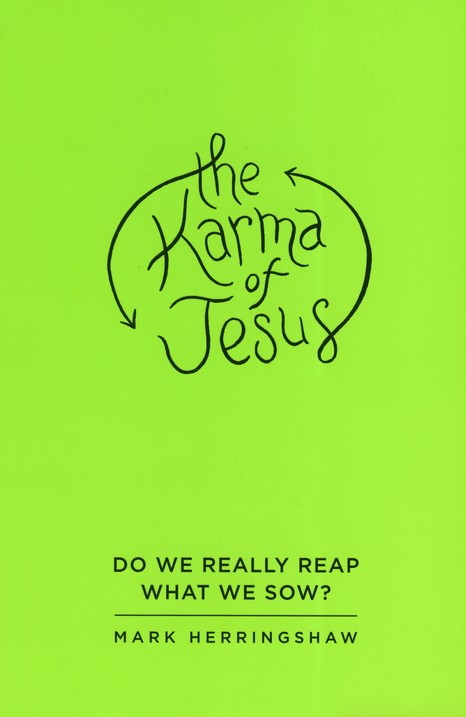Reaping What You Sow: Christian Karma?

Editor's Note: The following is a report on the practical applications of Mark Herringshaw's new book, The Karma of Jesus: Do We Really Reap What We Sow?, (Bethany House, 2009).
Many religions and philosophies promote the concept of karma: If you do something good, good will return to you, and if you do something bad, you'll experience something bad as a result. But if you really reap what you sow, then every mistake you make will keep haunting you. Jesus offers a much better way to live - with grace. Here's how you can trade karma for grace:
Recognize how complicated cause and effect are in real life. Karma sounds simple. But in reality, one cause rarely leads to just a single effect. Instead, each cause and each effect are intertwined with many others, causing a long chain of complicated interactions that aren't predictable. So it's naïve to expect that you can do something good and receive the result you hope for, or that when you do something bad you'll only experience a consequence that you can predict. No matter how hard you may try to control the process of cause and effect, your attempts are in vain in this complicated world where all people are connected in ways that can easily result in unpredictable outcomes.
Realize that bad happens more easily than good in this fallen world. While it's noble to try to do what's right as often as you can, you need to accept the fact that your sin nature often causes you to make mistakes. Since that's true for all other people, as well, bad things happen more often than good things. You're bound to accumulate more bad karma than good karma, despite your desire to do what's right.
Acknowledge your inability to fulfill God's standards of right and wrong. Since God is perfect, His standards reflect perfection, which is impossible for fallen human beings to achieve. So stop the futile effort of trying to earn enough good karma to achieve salvation with God. Acknowledge that you can't free yourself from sin, no matter how hard you may try to do so.
Recognize how other people's karma affects your own. Karma is contagious. You receive some of the effects caused by other people's choices, even when you don't want that to happen. Your own choices affect other people in either good or bad ways, whether or not you intend for that to happen. What happens in other people's lives crashes over into yours, and vice versa. So you can't truly be the master of your own destiny with karma.
Acknowledge that you owe a debt you can't pay. Since karma loads you up with responsibility for everything you cause, it saddles you with a huge debt you can't pay because all people cause more trouble than they can make up for in this fallen world.
Turn to the only one who's ever lived with perfect karma. Jesus is the only One who has ever lived a perfect human life. Only Jesus has the power to take your imperfect karma and forgive the debt you owe because of it.
Accept the forgiveness Jesus offers you. Jesus offers to forgive your karma debt by absorbing it into Himself through His sacrificial death on the Cross. Jesus paid for your sins and makes your salvation possible if you accept His forgiveness. So give your life to Jesus and trust Him to take your bad choices and use them to accomplish good purposes - something only He can do.
Invite Jesus to change your destiny. Once you've accepted Jesus' forgiveness that frees you from your debt of bad karma, you have an incredible opportunity: to love and be loved freely in a relationship with God. Move forward into that destiny with joy and gratitude. Every day, connect with Jesus in prayer and ask Him to work through you so you can learn and grow into a person who reflects more and more of His character. You'll still make mistakes since you won't be perfect until you get to heaven, but you won't have to worry about accumulating a huge burden of bad karma that you can't undo with good karma. You'll be free to live with grace, knowing that you can count on God to forgive your mistakes when you confess and repent, and resting assured that God will continue to empower you to grow into a person who makes more and more good choices that impact the world in positive ways. In fact, with grace guiding the process, the good choices you make will cause even more good to happen than you can possibly imagine, since there's no limit to what God can do through you.

Mark Herringshaw is a pastor, sought-after teacher, and conference speaker. The coauthor of two previous books, he leverages the crafts of storytelling, biblical scholarship, and scientific research to make complex ideas simple, practical, and transformative. Mark and his family make their home near St. Paul, Minnesota.
Publication date: September 3, 2010
Originally published May 07, 2014.







